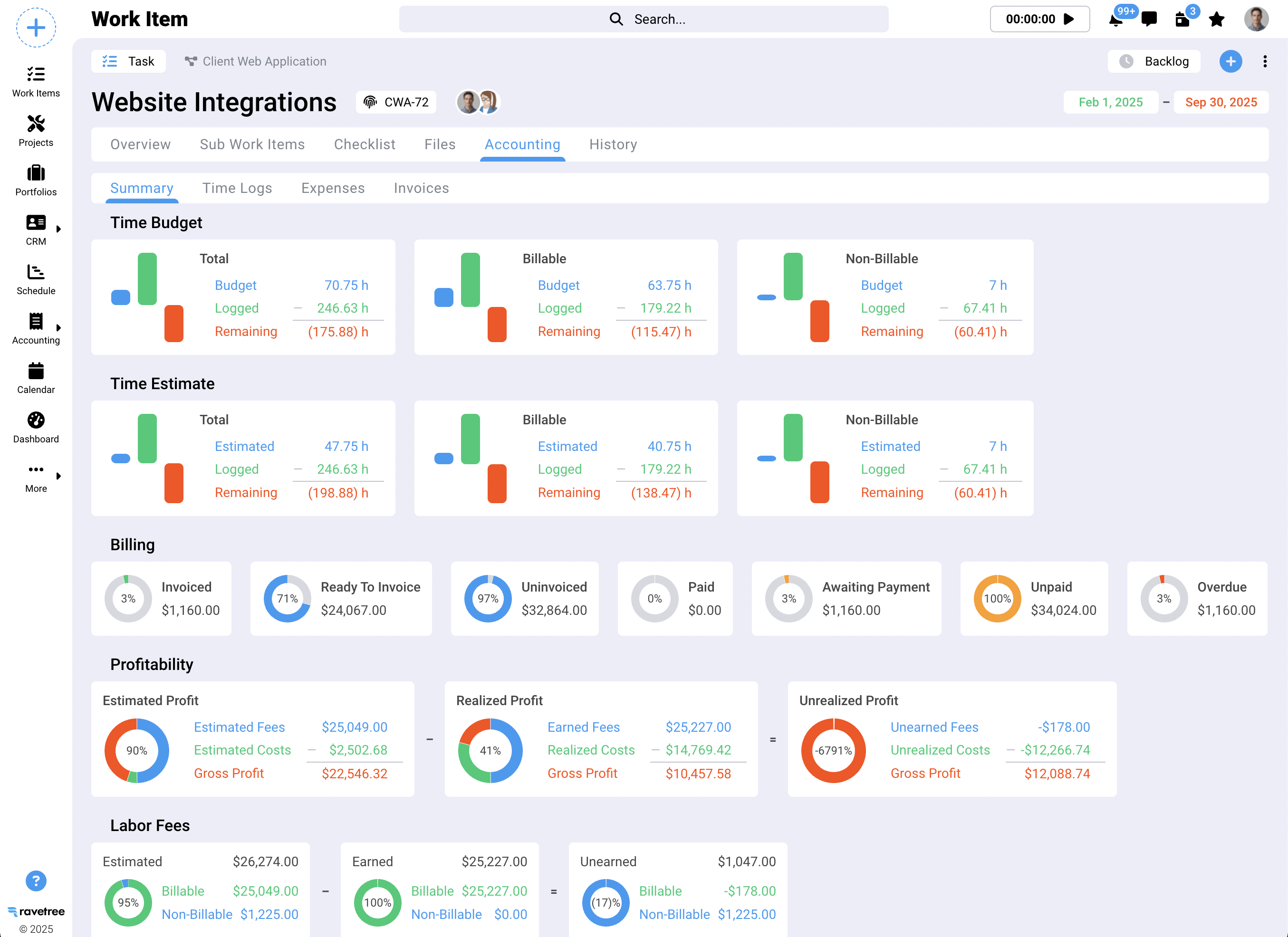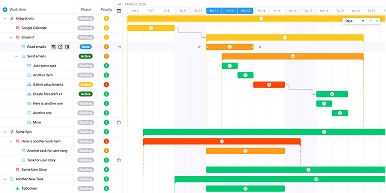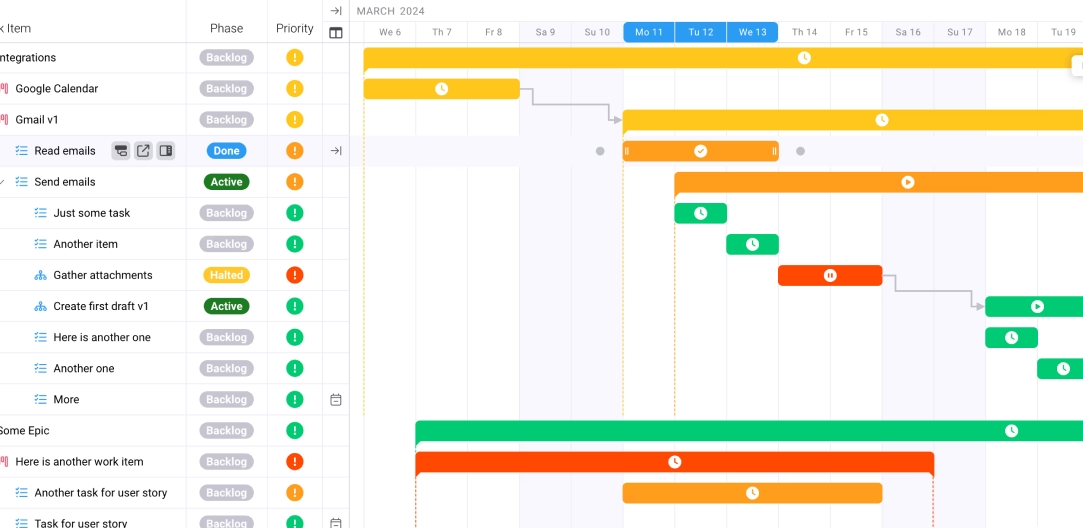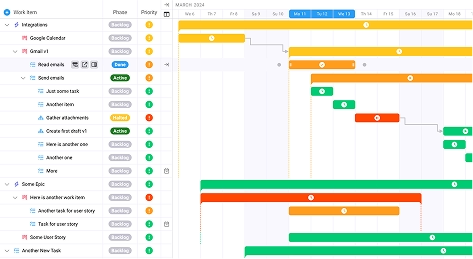
Ravetree vs. Wrike: Which Is The Best Tool For Service Firms?
Key takeaways:
The professional services landscape has reached a critical inflection point. While billable utilization has plummeted to 68.9% in the last year, far below the 75% benchmark, service firms are grappling with an unprecedented challenge: selecting the right work management platform can make or break operational success. The Ravetree vs. Wrike decision represents more than just choosing software—it's about fundamentally transforming how your firm delivers value to clients while maintaining profitability in an increasingly competitive market.
This comprehensive analysis examines two leading platforms specifically through the lens of service firm requirements, providing decision-makers with the strategic insights needed to make an informed choice that will drive long-term organizational success.
The Strategic Context: Why Platform Selection Matters More Than Ever
Professional service firms operate in a uniquely challenging environment where human capital serves as the primary revenue generator. Unlike product-based businesses, service firms must optimize for billable hour efficiency, client relationship management, and project profitability simultaneously. The wrong platform choice can compound existing operational inefficiencies and create costly bottlenecks that directly impact bottom-line performance.
73% of organizations expect to increase their use of hybrid project management practices over the next five years, indicating a fundamental shift toward more flexible, adaptable work management approaches. However, only around a third of firms employ project management software, with a sizable proportion using Excel for resource planning, revealing a significant opportunity for competitive advantage through strategic platform adoption.
The market dynamics support this urgency. Project management software will grow at a CAGR of 10.67% and will be worth $10 billion by 2026, driven largely by service firms recognizing the critical importance of operational optimization. Furthermore, the global project portfolio management market size is projected to reach USD 12,252.6 million by 2030, growing at a CAGR of 14.2%, highlighting the sustained investment in work management infrastructure.
Platform Architecture and Design Philosophy
Ravetree's Service-Centric Approach
Ravetree positions itself as purpose-built for client service businesses, offering an integrated ecosystem that combines project management, resource planning, time tracking, billing, CRM, and client portals within a unified platform. This architectural decision reflects a deep understanding of service firm workflows, where project success depends on seamless integration between operational and financial systems.
Ravetree has solidified its position as a leading platform in 2025 by delivering a powerful blend of project management, resource planning, time tracking, and client portals — all in one place. The platform's design philosophy centers on eliminating the operational friction that occurs when teams must navigate between disconnected tools to complete essential business functions.
The user experience reflects this integration priority. Ravetree offers a clean UI that's relatively easy to navigate between modules, enabling teams to move fluidly between project planning, time tracking, and client communication without context switching penalties. This design approach proves particularly valuable for service firms where project managers often wear multiple hats and need immediate access to diverse functionality sets.

Wrike's Enterprise-Scale Flexibility
Wrike takes a different architectural approach, emphasizing enterprise-grade scalability and customization capabilities. Over 20,000 organizations use the Wrike platform globally, positioning it as a proven solution for complex organizational requirements and diverse industry applications.
The platform's strength lies in its adaptability to existing workflows rather than prescribing specific operational methodologies. Wrike's extensive customization options, including custom fields, automated workflows, and configurable dashboards, enable organizations to mold the software to their unique requirements. This flexibility proves particularly attractive for established service firms with mature processes who prefer platform adaptation over operational restructuring.
Wrike's collaboration features excel in complex project environments involving multiple stakeholders, offering real-time document collaboration, sophisticated approval workflows, and granular external client access controls. The platform's business intelligence capabilities provide comprehensive performance analytics at both project and portfolio levels, supporting data-driven decision-making for strategic optimization.

Core Functionality Analysis
Project Management Capabilities
Both platforms offer robust project management functionality, but their implementation approaches reflect different philosophical priorities. Ravetree integrates project management directly with resource planning and financial tracking, enabling real-time visibility into project profitability throughout the execution lifecycle. This integration proves essential for service firms where project success must be measured not just by delivery metrics but by financial performance.
Wrike provides sophisticated project hierarchy management and portfolio-level insights, particularly valuable for larger service firms managing complex client relationships with multiple concurrent engagements. The platform's Gantt chart capabilities and dependency management support detailed project planning scenarios common in consulting and professional services environments.
Resource Management and Capacity Planning
Resource planning represents a critical differentiator for service firms, where human capital optimization directly impacts profitability. Ravetree's approach integrates capacity planning with skill-based resource allocation, enabling project managers to match team members to assignments based on both availability and expertise requirements.
The platform's workload visualization provides real-time insights into team capacity, helping prevent the resource over-allocation issues that plague many service firms. This capability proves particularly valuable given that 53% of projects are run by non-certified project managers, who may lack the experience to effectively balance resource demands across multiple concurrent projects.
Wrike offers comprehensive resource management through workload charts and allocation tracking, with particular strength in visualizing resource distribution across complex project portfolios. The platform's resource management capabilities scale effectively for larger organizations with diverse skill requirements and complex project interdependencies.
Time Tracking and Billing Integration
For service firms, accurate time tracking directly impacts revenue recognition and client billing accuracy. Ravetree's integrated approach connects time tracking seamlessly with project budgets and client rate structures, enabling automatic calculation of project profitability and budget variance analysis. This integration eliminates the manual reconciliation processes that consume administrative overhead in many service firms.
The platform supports multiple billing methodologies, including fixed-fee, time-based, and hybrid project structures common in professional services. Client rate cards with customizable date ranges ensure billing accuracy across long-term engagements where rates may change over time.
Wrike provides time tracking functionality through its interface, though billing integration requires third-party connections or manual processes. This approach offers flexibility for organizations with existing financial systems but may create integration challenges for firms seeking streamlined workflows.
Industry-Specific Considerations
Marketing and Creative Agencies
Marketing agencies require specialized functionality for creative project management, including digital asset management, approval workflows, and client collaboration capabilities. Ravetree's integrated client portal functionality enables real-time project visibility and file sharing, enhancing client engagement throughout the creative development process.
The platform's project budgeting framework proves essential for agencies managing campaigns with complex cost structures involving media spend, production costs, and labor allocation. Real-time budget tracking helps prevent the cost overruns that can devastate agency profitability on fixed-fee engagements.
Research reveals that organized marketers are almost 7 times more likely to report success than their peers, highlighting the competitive advantage that effective work management platforms provide in agency environments.
Consulting and Professional Services
Consulting firms require sophisticated project management capabilities that can handle the complex, custom workflows typical of strategic engagements. Both platforms offer the flexibility needed for consulting work, but their implementation approaches differ significantly.
Ravetree's strength lies in its integrated approach to project economics, enabling consultants to track project profitability in real-time while managing client communications through integrated portals. This capability proves essential for consulting firms where project economics must be carefully managed to maintain target margins.
Wrike's customization capabilities enable consulting firms to create sophisticated workflow templates that can be replicated across similar engagement types, improving consistency and reducing project setup overhead.
Accounting and Legal Services
Professional service firms in regulated industries require platforms that can support compliance requirements while maintaining operational efficiency. Ravetree's integrated approach to client management and time tracking provides the audit trail capabilities essential for billing transparency in professional services environments.
The platform's reporting capabilities enable firms to generate the detailed time and expense reports required for client billing and regulatory compliance. Integration between project management and financial tracking ensures that billable hour requirements are consistently met across all client engagements.
Implementation and Adoption Considerations
Learning Curve and User Adoption
Platform adoption success often depends more on user acceptance than feature comprehensiveness. Ravetree's integrated design reduces the learning curve by presenting related functionality within unified workflows, enabling teams to master the platform more quickly than systems requiring extensive customization.
The platform includes comprehensive onboarding support and training resources designed specifically for service firm workflows. This industry-specific approach accelerates adoption by focusing on use cases directly relevant to service firm operations.
Wrike's extensive customization capabilities can create a steeper learning curve, particularly for organizations without dedicated platform administrators. However, this flexibility enables the creation of highly optimized workflows that can improve long-term productivity once teams master the system configuration.
Integration Ecosystem
Service firms typically operate multiple specialized systems for accounting, CRM, and business development. Ravetree's pre-built integrations with common business applications such as QuickBooks, Xero, and HubSpot, reduce implementation complexity while maintaining data consistency across systems.
The platform's API capabilities enable custom integrations for firms with specialized system requirements, though the extensive out-of-box functionality often eliminates the need for complex integration projects.
Wrike offers over 400 pre-built integrations, providing extensive connectivity options for organizations with complex system landscapes. This integration breadth proves particularly valuable for larger organizations with diverse technology requirements.
Total Cost of Ownership Analysis
Pricing Structure and Value Proposition
Platform selection decisions must consider both direct subscription costs and indirect implementation expenses. Ravetree's all-in-one approach can reduce total cost of ownership by eliminating the need for separate time tracking, billing, and client portal solutions.
The platform's transparent pricing structure includes comprehensive functionality within each tier, reducing the risk of unexpected costs as teams expand platform usage. This pricing predictability proves essential for service firms managing tight project margins.
Wrike's tiered pricing structure enables organizations to scale functionality based on specific requirements, though advanced features may require higher-tier subscriptions that impact total cost calculations.
Return on Investment Considerations
Over 88% of organizations are using project management software, but success depends on selecting the right platform for your specific context. The ROI calculation for work management platforms extends beyond operational efficiency to include client satisfaction improvements, project profitability optimization, and competitive differentiation.
Ravetree's integrated approach to project profitability tracking enables firms to optimize margins through real-time visibility into project economics. This capability can generate significant ROI by preventing cost overruns and identifying optimization opportunities that improve overall firm profitability.
Performance Metrics and Success Indicators
Comparative Performance Analysis
Independent analysis provides valuable insights into relative platform performance. Side-by-side comparison shows Ravetree scoring 84% compared to Wrike's 83%, indicating comparable overall functionality with slight advantages varying by specific evaluation criteria.
User satisfaction metrics reflect the importance of platform fit for specific organizational requirements. Service firms should prioritize platforms that excel in areas most critical to their operational success rather than focusing solely on comprehensive feature sets.
Key Performance Indicators for Service Firms
Successful platform implementation should deliver measurable improvements in billable utilization, project profitability, and client satisfaction scores. Ravetree's integrated reporting capabilities enable firms to track these metrics continuously, supporting ongoing optimization efforts.
The platform's real-time project budget tracking helps identify variance trends before they impact project profitability, enabling proactive management interventions that improve overall firm performance.
Strategic Implementation Framework
Assessment and Selection Process
Platform selection should begin with a comprehensive assessment of current operational challenges and strategic growth objectives. Service firms should prioritize platforms that address their most critical pain points while providing scalability for anticipated growth scenarios.
The evaluation process should include testing both platforms with real project scenarios to assess workflow compatibility and user acceptance. This practical evaluation approach often reveals usability considerations that may not be apparent through feature comparison alone.
Change Management and Adoption Strategy
Successful platform implementation requires comprehensive change management planning that addresses both technical and cultural adoption challenges. Service firms should develop training programs that focus on workflow optimization rather than just feature functionality.
Leadership engagement proves critical for adoption success, particularly in professional service environments where senior professionals may resist operational changes that impact their established work patterns.
Future-Proofing and Platform Evolution
Technology Roadmap Considerations
Platform selection decisions should consider long-term technology evolution and vendor commitment to service firm requirements. Ravetree's focus on client service businesses suggests continued investment in features specifically valuable for service firm operations.
The platform's commitment to integrated functionality aligns with service firm requirements for streamlined operations and reduced system complexity. This architectural approach provides confidence in long-term platform viability for service firm use cases.
Market Evolution and Competitive Dynamics
The work management software market continues evolving rapidly, with vendors increasingly recognizing the unique requirements of service firm operations. Platform selection should consider vendor positioning and investment priorities to ensure long-term alignment with organizational needs.
Conclusion
The Ravetree vs. Wrike decision ultimately depends on organizational priorities, operational complexity, and strategic growth objectives. Ravetree excels as a comprehensive solution for service firms seeking integrated functionality that streamlines operations while providing real-time project profitability insights. Its purpose-built approach for client service businesses reduces implementation complexity while delivering immediate operational value.
Wrike provides enterprise-grade flexibility and customization capabilities that support complex organizational requirements and diverse workflow needs. The platform's extensive integration options and scalability make it particularly suitable for larger service firms with sophisticated operational requirements.
Service firms should prioritize platforms that address their most critical operational challenges while providing clear pathways for growth and optimization. The most successful implementations focus on solving specific business problems rather than maximizing feature comprehensiveness. Whether choosing Ravetree vs. Wrike, success depends on selecting a platform that aligns with organizational culture, operational requirements, and strategic objectives while providing the specialized functionality that service firms need to compete effectively in an increasingly demanding marketplace.
Frequently Asked Questions
What makes Ravetree specifically better for service firms compared to Wrike?
Ravetree was purpose-built for client service businesses, offering integrated project management, billing, CRM, and client portals in one platform. This eliminates the need to manage multiple disconnected tools and provides real-time project profitability tracking that's essential for service firm operations.
Can Wrike handle complex service firm requirements like billable hour tracking?
Yes, Wrike offers time tracking functionality and can handle complex project requirements. However, billing integration typically requires third-party connections or manual processes, whereas Ravetree provides native billing capabilities with client rate cards and automated invoicing.
Which platform offers better client collaboration features?
Both platforms offer client collaboration capabilities, but Ravetree provides dedicated client portals with branded interfaces that enhance client relationships. Wrike offers external user access and collaboration features but may require more configuration for optimal client engagement.
How do the platforms compare in terms of implementation time?
Ravetree typically offers faster implementation due to its integrated, out-of-the-box functionality designed for service firms. Wrike's extensive customization options may require longer setup times.
What's the pricing difference between Ravetree and Wrike for service firms?
Pricing varies based on team size and feature requirements. Ravetree's all-in-one approach may offer better value for service firms by eliminating the need for separate billing and CRM solutions. Wrike offers tiered pricing that can be cost-effective for teams needing basic project management without integrated billing capabilities.
Which platform scales better as service firms grow?
Both platforms scale effectively but differently. Ravetree scales by adding integrated functionality while maintaining operational simplicity. Wrike scales through customization and advanced features, making it suitable for larger organizations with complex requirements and dedicated platform administrators.
Do either platforms offer industry-specific templates for service firms?
Ravetree provides highly customizable templates and workflows that are well suited for marketing agencies, consulting firms, and professional services. Wrike offers general project templates that can be customized for service firm use but may require more configuration to optimize for industry-specific workflows.
How do the reporting capabilities compare for service firm needs?
Ravetree offers integrated financial reporting that combines project performance with profitability metrics, essential for service firm management. Wrike provides comprehensive project reporting and business intelligence features but may require additional tools for integrated financial analysis.








